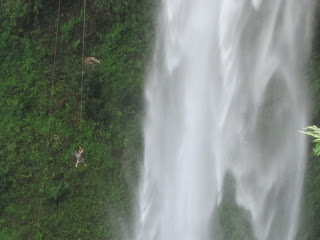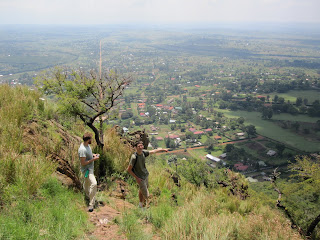After buying and bringing home my new Yamaha Mate, I realized I wanted to be able to lock it. Tororo, in my opinion, is much safer than New York, but still, things walk away. (The other day, someone's laptop was stolen when she stepped away from her desk for 5 minutes. It subsequently created 3 hours of chaos at the clinic, but was never recovered).
There is supposed to be a lock for the front wheel, but our key didn't work in it, so we took it to a mechanic, and that's where it all started.
The mechanic's name is Pastor. He is called that because he is, in fact, a Pastor. He also plays solo guitar, in case you were curious.
He is slight, has a lisp, and wears no shirt, only a yellow plastic pullover vest, like the kind you use playing tag football. He is very sweet, and seems to know these bikes well.
The first time we went to see him, he gave us very tasty watermelon with more seeds than I had ever seen in a watermelon. It was about 50% seed, but very sweet. They brought us about 6 slices. We each ate 1 slice, and they insisted on wrapping the rest in a plastic bag for us to take home. (It got squashed in our bag.)
We decided to fix more than the lock. I had had trouble starting the bike for over 30 minutes that morning, and so we asked him to look at that. (Of course, at his shop, the bike started perfectly). We also asked him to check the alignment, and see if he could get the neutral indicator light to work and maybe the spedometer and gas gauge. He drove around on it with me, and noticed that the brakes didn't work well. He also noticed that the engine seemed weak, and speculated that new spark plugs were needed. He also offered to change the signal lights, which were scratched up and ineffective. There was talk of replacing the battery, which seemed weak as well.
So, lots of things. I was under no illusion that all of them would get done.
I dropped off the bike in the morning, and Pastor said he might be done by after 12. That seemed fast to me, but ok.
He showed up at the clinic at 11:30, looking embarrassed and asking (in a roundabout, sheepish way) for money to buy the replacement parts we had asked for. I gave him some (plus extra) and we agreed that he needed until after 5 to finish.
At 5, I took a bodaboda to his shop, but he was still working on it. He showed me what he had done so far, and what was left to do. "So the bike will sleep here tonight, and I will bring it to you in the morning at the hospital."
His phone, of course, had
fallen in the water, so I couldn't call him to check on it.
The next day, I didn't hear from Pastor, but we went back in the evening, and the bike looked almost done. He said it would be another hour. We wanted to go swimming before dark, so we agreed that we would wait until morning.
To his credit, each time we went to check on the bike, we added more things to look at, so it took longer as a result. Each time we arrived, Pastor and his multiple assistants were working furiously on the bike, and he ran through each area of repair with us. There seemed to be progress, and, like everything in life, it just took longer than expected.
The next morning, I didn't hear from Pastor. We went to the shop in the afternoon, around 4:30pm, and it was very close to done. His assistants were changing the oil, and then the lights needed to be attached. I had a phone meeting at 5, so Scott waited for the bike. At 5:50, Scott and Pastor showed up at the clinic with the repaired and functional Mate. Pastor had a bill with a full listing of parts he had replaced at our request, and then a bill for service. The parts came to USh 90,000 ($45), and the labor came to USh 48,000 ($24) - for 3 days of work with 1 mechanic and 2-4 assistants.
We agreed that Scott would drive Pastor back to his shop, and then come and pick me up. I waited a while, then went outside and called him. "We're having white bread and coke." (Every time we went to see Pastor, he offered us a different form of snack - watermelon, peanuts, white bread and coke, etc., and sent us home with the remainder).
I waited outside, talking on the phone for a long time. As women and adolescent girls passed by, they smiled at me, greeted me, and sometimes shook my hand. Many bodabodas passed by offering a ride.
Scott was stuck on the road. The first time he tried to leave Pastor's shop, the wheel almost fell off. It seems that the assistants had used a nut that had been stripped, and so it loosened. That fixed, Scott took off to meet me, and halfway to reaching me, the bike died. He was walking the bike to me. We guessed that the bike was out of gas, since the mechanic had probably had it running a lot to test it.
I hopped on a bodaboda and had him drive me to Scott. The driver said he could take me to get gas. We went to a gas station, where they suggested I buy a "Gerrycan" to hold the gas. The boda driver then took me to the next street over, where I bought a 1 liter plastic milk bottle for USh 1000 (50 cents), and drove me back to the gas station. They filled the bottle for USh 4800 ($2.40) and we drove back to Scott, where we filled the tank.
I paid the driver USh 3000 ($1.50) - triple the normal rate for a boda ride.
As Scott had been waiting for us on the road, a man named Josem had come to talk to him. He was the brother-in-law of the owner of a small storefront on that block, and he came to thank us for our "patronage" of his shop. (We've been there twice.) He seemed very sweet, and we told him we liked his lentil samosas.
He encouraged us as we tried to start the bike again, confident that it would work. As the gas made it through the system, the bike finally started. We thanked Josem, and we were off. We drove home without a problem, except that the headlight on the bike is very weak, making it hard to see potholes very far ahead, now that it was dark. We drove slowly.
The bike does seem better. We weren't able to fix the electrical system - Pastor looked at it (getting to it was part of the delay), but it would be too complicated/expensive to fix. He did replace the spark plugs, put on a chain cover and fix the front and back brakes. He also made a new key for the wheel lock, so it works now. He didn't remember to change the battery, but I think we can do that ourselves.
This morning, when I went to start the bike to leave for work, it didn't start - again! Scott's theory is that the oil gets cold overnight and then thickens too much, and needs to warm up before the bike can start. And after about 15 minutes of trying to start it, it did work. We're going to leave it in a sunny place, and maybe get thinner oil.






































